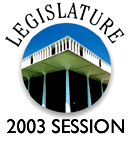
Legislative passage
of tax bill ruled legal
Attorney General Mark Bennett has determined there is no clear showing that the Legislature's handling of an important tax bill this year was unconstitutional.
The state Constitution requires that to become law, a bill must have passed three readings on separate days in both the House and Senate.
Legislature Directory
Legislature Bills & Hawaii Revised Statutes
At issue was whether Senate Bill 1394 passed the required three readings in the Senate.
It is the annual measure that keeps Hawaii's tax code in conformity with most parts of the federal tax code, making it simpler for Hawaii taxpayers to file their state income tax returns.
"The information received from the Senate was subject to different interpretations," Deputy Attorney General Maurice Kato said Wednesday. "One was that it didn't pass three readings, and one that it did."
Kato was assigned to review the bill.
"The attorney general took the position that there is a presumption of regularity" in the Legislature's handling of the bill, Kato said. "He didn't feel it was clearly defective, and there wasn't enough information to recommend a veto."
Gov. Linda Lingle signed the bill into law on Tuesday.
Last month, Ken Takayama, acting director of the Legislative Reference Bureau, sent a general distribution letter saying SB1394 "did not pass second reading in the Senate and therefore should not be listed in the bills passed by the Hawaii State Legislature, Regular Session of 2003 list."
The bureau's official tracking of SB1394 shows that on Feb. 19 it went to the Senate floor, where a motion was approved to return it to the Ways and Means Committee for further consideration.
The tracking shows it returned to the Senate floor on Feb. 28 where it was approved on third reading March 4 and sent to the House.
Senate Clerk Paul Kawaguchi said that while the official tracking of the bill shows no passage on second reading in the Senate, the Senate's "Order of Business" -- the written agenda -- for Feb. 19 lists the bill as coming from the Ways and Means Committee, which "recommends passage on second reading and recommittal" to the committee.
What Senate members thought they were voting on, based on the written agenda, probably is more important than what clerks recorded about the progress of the bill, Kawaguchi said.
However, Bennett observed that even if the bill did not pass on second reading on Feb. 19, the House later amended the bill and returned it to the Senate, which then voted to accept the House's changes.
That final vote by the Senate on May 1 constitutes the third required reading in the Senate, Bennett said.
Important parts of this year's bill puts Hawaii's code in line with the federal code on amounts and timing of tax-deferred contributions to retirement plans, according to Lowell Kalapa, president of the Tax Foundation of Hawaii.
State law requires the Department of Taxation each year to submit a bill to amend Hawaii's income tax law to conform to any changes made in the Internal Revenue Code, making it easier for Hawaii taxpayers to prepare their state returns.
